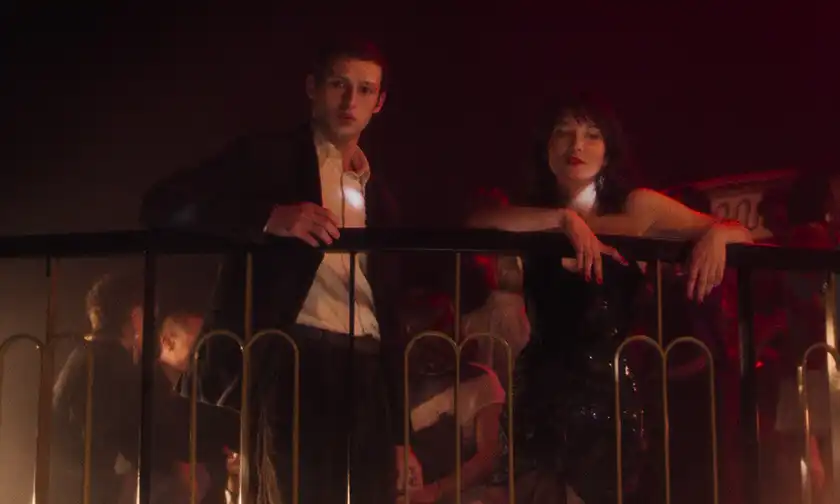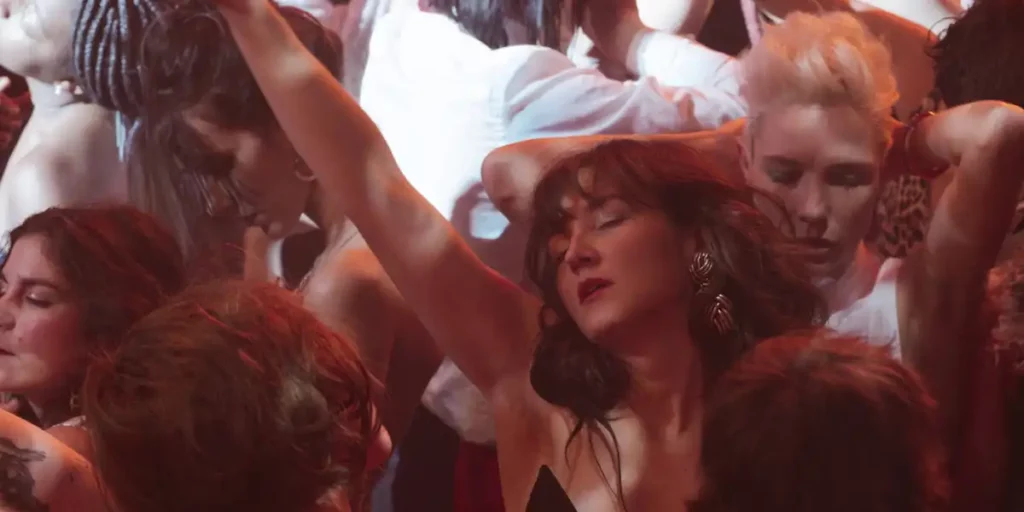Patric Chiha’s film adaptation of The Beast in the Jungle is an enthralling and purposefully frustrating mediation on the passing of time.
Bertrand Bonello isn’t the only filmmaker releasing a loose, cinematic adaptation of Henry James’ acclaimed and existential short story, ‘The Beast in the Jungle’, this year. Austrian director and screenwriter Patric Chiha has also decided to make his version of the tale centered on destructive selfishness and the importance of love in our lives. Instead of being set in early 20th-century London like its source material, Chiha’s The Beast in the Jungle (La Bête dans la Jungle) transports us into a nameless Parisian nightclub. People gather to dance the night away and indulge in myriad drinks to drown their sorrows, garnering an escapist feeling as long as the music keeps playing. But Chiha portrays it as a purgatory masquerading as a discotheque.
These clubbing denizens seek the strobing lights, hypnotic hymns of techno music, and cocktails to cause an anesthetic chain reaction. But they don’t realize that time stands still until they confront their troubles. Not everybody is worthy to enter this club, as the Physiognomist (Béatrice Dalle, who reunites with the director after his 2009 debut, Domain) is at the gate searching for men and women she deems as lost souls. That’s where the film’s two protagonists, May (Anaïs Demoustier) and John (Tom Mercier), enter the picture, both aimless in life and in love. This is the story of their reunions at this place throughout the decades, as the dying days of disco in the early 1980s transitioned into the techno-fueled 2000s (1979 – 2004).
Out of sheer luck, Mary and John meet again ten years after their first encounter. The two are complete opposites. Mary is a joyful, extroverted gal with much to look forward to in life; meanwhile, John is a lonely man who often lurks in the corners of the club brooding. He doesn’t recall their first meeting, but Mary isn’t bothered by his forgetfulness. She is still interested in him due to a secret he told her back then, one that John doesn’t remember telling her. John feels that he’s destined for great things in life; he is waiting for a life-changing experience that might lead to a prosperous future or, in the worst cases, a catastrophic one.
The Physiognomist, who oversees everything occurring in the club, compares John’s secret with “a beast in the jungle” – fate waiting to attack its prey when he least expects it. Because Mary is infatuated with this “forthcoming” breakthrough, the two plan to meet every Saturday in that nightclub for the next couple of years. As life passes them by, without a single hint of John’s life-changing experience in sight, these doomed lovers become spectators, even in their own lives. Mitterand is elected, the Berlin Wall is destroyed, and the 9/11 terrorist attacks occur, yet none of the events manage to leave a mark on them. Their insistence on only “living” for this transformative occurrence, whatever it may be, has latched onto them like a curse.

Patric Chiha shows the passing of time by switching the records playing in the establishment, showing us the transition from the synth-focused disco to the noisy, pumping beats of techno and making the Physiognomist announce the beginning of the new year in a New Year’s Party the club is hosting. Each reunion drains more of their essence; time passes them by, and they can’t even notice it until it’s too late. They are psychologically broken. The repetitive nights of pondering and daydreaming about the future are slowly taking a toll on them. John Marcher has spent his entire life waiting for something impactful to happen. But at what cost? John wasted more than twenty-five years by refusing to live because of it. And he dragged Mary into this mess.
Mary spent her youth wallowing in the discotheque of melancholy all because of John’s secret. The viewer grows frustrated with this dynamic, wanting to see Mary finally be able to live her life. This effect on the viewer comes with a purpose; you are meant to feel the grueling nature of wasted time. Each Saturday that goes by fuels this sensation more and more. The nightclub grows into this vacuous space that devours the youth’s hopefulness, like a vampire sucking the blood of an innocent bystander. While I think this manner of interpreting Henry James’ novel is quite fascinating, it arrives as a double-edged sword that hurts the film. Since the Austrian filmmaker often relies on repetition to show the passing of time, each scene feels similar.
As the film runs its course, plenty of scenes begin to meld with one another, confusing the viewer in the process. This happens because in between each transition from one period to another, Chiha doesn’t let the camera linger for long enough to make Mary and John’s existential conversations have their full effect. Sure, the presentation is still hallucinatory, due to Céline Bozon’s stylish cinematography. But the editing in the most essential scenes does take you away from the experience to some degree. Regardless of those editing choices, the rest is beguiling, headlined by Demoustier and Mercier’s fascinating multi-layered performances — great French actors who have strived in indie projects and deserve more time in the spotlight.
The Beast in the Jungle (La bête dans la jungle) is a project that showcases the best of their abilities: Demoustier’s ability to transition from vivacious to sentimental with ease and Mercier’s knack of making us care about characters who present themselves as cold. While their work here isn’t near the best of their careers, they lift this film onto new heights, a stylish and thought-provoking meditation on the passing of time and lost opportunities.
The Beast in the Jungle (La Bête dans la Jungle) is now available to watch on Mubi, on digital, and on demand.

